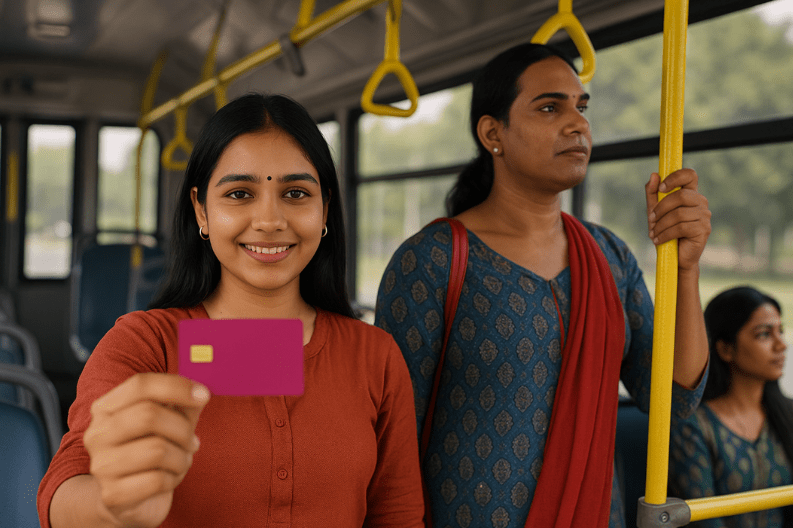The Delhi government has introduced a new travel initiative called the ‘Pink Saheli Smart Card’, marking a big step toward free bus rides for women & transgender. This card allows women and transgender individuals aged 12 and above to travel free of cost on all Delhi Transport Corporation (DTC) and cluster buses.
Chief Minister Rekha Gupta announced the plan on social media. She wrote, “The Delhi government has launched the Pink Saheli Smart Card for women and transgenders. Now, daughters, sisters, and mothers above 12 years of age can travel freely and safely in DTC and cluster buses.” She added that this move aims to make public travel safer, easier, and more respectful for women and transgender citizens.
This project serves two important goals. Firstly, it encourages more women and transgender individuals to use public transport regularly. Secondly, it ensures that they receive better travel facilities and dignity while commuting. Public transport plays a vital role in Delhi’s daily life, and this programme will make it more accessible for thousands of residents.
The Pink Saheli Smart Card is a part of the National Common Mobility Card (NCMC) system. This advanced digital card can be used across multiple transportation services. It can also be recharged easily, helping travelers move smoothly around the city without cash or paper tickets.
To apply for the Pink Saheli Smart Card, applicants must meet certain requirements. They should be residents of Delhi, be at least 12 years old, and provide valid identification proof. The Delhi Transport Corporation has partnered with several banks to create and distribute these smart cards. This move replaces the outdated paper ticket system, which often allowed misuse and lacked accountability.
People can apply for the card through the Delhi government’s official website. A special online portal has been launched to make registration simple and quick. The government’s digital approach makes the process transparent, efficient, and environmentally friendly.
This programme also connects to a larger effort to modernize India’s public transport. For example, in Punjab, public transport networks such as Punjab Roadways and Punjab Transport serve many routes but still face issues like overcrowding and old ticketing systems. Similar smart card systems could help make these services safer and more convenient.
In Chandigarh, known for its high quality of life, many residents rely on buses for daily travel. A similar card could make commuting even easier for women and transgender passengers there. With modern ticketing and better safety, public transport can become more inclusive and reliable.
The Delhi government has also planned awareness drives to help citizens understand how to use the Pink Saheli Smart Card. Officials believe that easy access to public transport will not only improve mobility but also boost confidence and independence among women and transgender people.
Overall, the Pink Saheli Smart Card represents a strong step toward equality and empowerment. It promotes free bus rides for women & transgender people, encouraging more inclusive travel in Delhi. If other cities adopt similar systems, India’s public transport network could become smarter, safer, and more people-friendly for all.



